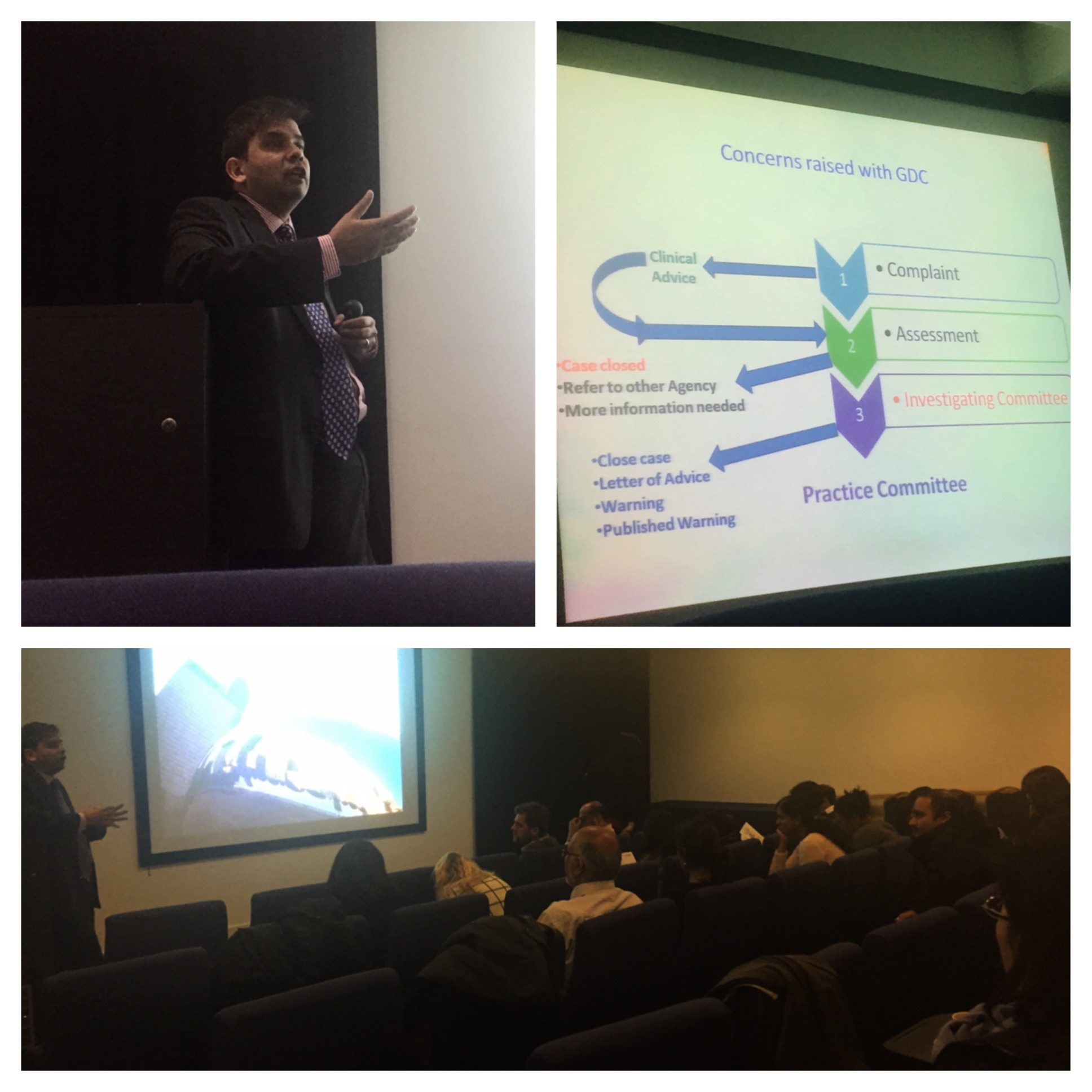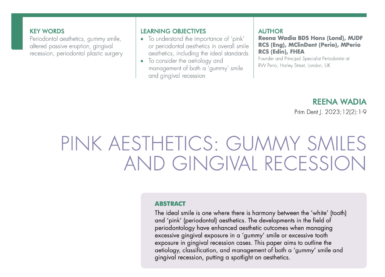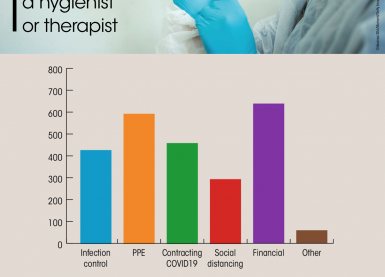December 3, 2014

Facts & Figures
- There has been a 200% increase in UK dental claims at DPL from 2010.
- 14,800 cases open at DPL – huge case load (December 2013).
- Everyone is likely to get sued (an actual claim including a GDC case) at least 3-4 times during their career according to current statistics.
- The GDC take more action against their own registrants than any other country! They also take more action against their own members more than any other bodies in other regulatory fields.
- The GDC is sitting every day at several venues due to the number of hearings required.
- The GDC have not given any genuine reasons as to why these numbers are so high and perhaps the huge numbers suggest the fitness to practice processes are flawed.
Interesting Quote
“Dentists don’t sell things or even services, they sell a part of themselves – they sell their capability, their consistency, their compassion. Seeking to oversimplify this by comparing patient care to the price of baked beans and sun-dried tomatoes completely misses the point” – Peter Ward, BDA Chief Executive (23/5/14).
Claims, Success Fees, ATE Premiums & Proportionality
- Sources of referrals for claims – patients, public, whistle-blowing, employers, other regulator e.g. CQC, police, NHS/LATs, anonymous and self-referral.
- Success fees – Success fees will no longer be recoverable from the losing side. In future any success fee will be paid by the CFA funded party (out of any recoveries it makes) rather than by the other side. Success fees capped at 25% of damages.
- After the event insurance (ATE) premiums – ATE insurance premiums under any insurance policy taken out after 1 April 2013 will no longer be recoverable. In future the insured party (the claimant) rather than the other side, will be expected to pay any ATE insurance premiums.
- Now that the success fee is no longer recoverable, smaller claims may no longer be viable, as damages will need to be off set against the success fee/ATE premium. The result being the successful party may not recover any damages at all.
- Proportionality – The overriding objective in Civil Procedure Rules has been updated so that all cases should be dealt with “justly and at proportionate cost”. The court will not allow parties to incur costs that are disproportionate to the value, complexity and importance of the claim, even if they are reasonably or necessarily incurred.
- Subscription fees to the defence companies should also go down because of the above point.
Fitness to Practice Process
- Overview:
1) New referral
2) Triage (2,838)
3) Assessment (1,236)
4) Investigating committee (535)
5) Practice committee (289)
6) Resumed hearing - So when concerns are raised with the GDC, the first step is that the clinical advice is given for that complaint. It then enters the assessment phase after which the case is either closed, referred to another agency or more information is requested. If the case proceeds to the investigating committee then the case can then be closed, a letter of advice given, or a warning published. If the case continues past the investigating committee it will need to go through the practice commitee.
ARF Timeline
- June 30-September 2014 – ARF consultation
- 30 June proposed increase – 64% increase from £576 to £945
- 18 July – DCS advert in Daily Telegraph
- 17 September – 4000 responses to consultation, 97.3% reject increase
- 17 October – BDA judicially reviewing legality of consultation
- 30 October – GDC meeting decision: £890 dentists, £116 DCPs
CPD Changes
- The CPD cycle is changing as revalidation is on its way.
- GDC proposals: Dentist verifiable CPD from 75 hours to 100 hours, clinical DCPs 75 hours, dental nurses and dental technicians 50 hours.
- There will be no requirement for declaration of general (non-verifiable) CPD hours.
- There will be a requirement for a CPD record with a plan for the 5 year cycle based on individual reflection with others, learning outcomes and a timeframe.
- Failure to submit the record can lead to erasure from the register.
- Moving from core CPD to core areas to learning outcomes.
- Learning outcomes: Effective communication with patients, the dental team, and others across dentistry in relevant circumstances, including when obtaining consent, dealing with complaints and raising concerns where patients are at risk; Effective management of oneself, and effective management of, or work with, others in the dental team, to serve the interests of patients at all times, and provide constructive leadership where appropriate; Maintenance and development of knowledge and skill within a practitioner’s field of practice; Maintenance of skills, behaviours and attitudes which maintain patient confidence in the practitioner and dental profession and put patients’ interests first.
Consent & Evidence-Based Dentistry
- GDC Standard 7.1 states you must provide good quality care based on current evidence – you must find out about current evidence and best practice which affect your work.
- With gaining consent there is clearly information asymmetry – you have more knowledge than your patients. This gulf in knowledge between the patient and clinician needs to be levelled as much as possible – the consent process provides an opportunity to share risks with your patient.
- The paradox about EBD is that the more clinical work you do and the more experienced you become, the more single-minded you become about possible treatment options as you only want to offer the patiet thr right option. However, regardless of this make sure you offer the patient all the options even if your chosen one(s) may have the better prognosis. The patient is entitled to make a decision for himself or herself.
- Interesting paper by Danzinger on extraneous factors in judicial decisions has shown the time of day affects our decision making process!
- Kouchaki’s Harvard study has shown that people are 20-50% more likely to be dishonest in the afternoon (3 pm – 6 pm) because they were depleted of the resources needed for self control. Even ethical people can’t avoid it! In fact, the effect was strongest for people with lower propensity for mortal disengagement. Exhaustion has its costs, and one is a loss of control over the ability to make ethical choices.
New Contract & Expected Requirements
- Care pathways currently include categorisation of risk and can’t provide a certain form of treatment unless stabilised.
- Advanced care pathways can only be entered if the patients oral environment is secure and the treatment is clinically feasible and beneficial.
- So if the contract says no to a certain form of treatment and you know it’s not in the patient’s best interests but the patient wants to pay privately what do you do? This is a common ethical dilemma and leads one to wonder if the patient’s consent trumps pathways and guidance especially when all English law is based on the fact that patients should be able to make decision autonomously. There is clearly of challenge of also mixing NHS and private. The GDC state we are allowed to mix NHS and private but we need to make sure we are clear which one is which and ensure the patient is not mislead. The GDC also emphasise that is it important not to pressurise patients into having private treatment.
- There is likely to be an introduction of skill levels ranging from level 1 to 3. This will be related to treatment complexity.
- The CQC currently check compliance with no differentiation – in the future there will be differentiation with ratings of outstanding, good, required improvement or inadequate.
- Encourage your patients to tell you what you are doing wrong! The NHS choices website is a common platform and popular way of assessing the practice. It asks patients for star ratings and answers to various questions. Ensure your practices comments on all of the statements made by the patient. Make sure you have gained web editor rights and comment administer rights – contact your local area team for help with this.
- Dental quality outcome framework – 10% income from new contract from quality so these will be important – DQOF – clinical effectiveness, patient experience and safety.
- Patient experience indicators for payment account for 30% and include questions such as: How satisfied were you with the cleanliness of the practice? How helpful were the staff at the practice? How satisfied were you with the NHS dentistry received?
- The Friends and Family Test (FFT) will be a contractual obligation for all practices providing NHS services from April 2015. The questions that will be asked: How likely are you to recommend our dental practice to friends and family if they needed similar care or treatment?
- For the FFT, practise must provide an opportunity for people who use the practice to give anonymous feedback and should use the standard wording of the FFT question. Practices will be required to include at least one follow up question, which allows the opportunity to provide free text. This data will then be submitted to NHS England each month and results published or displayed locally.



